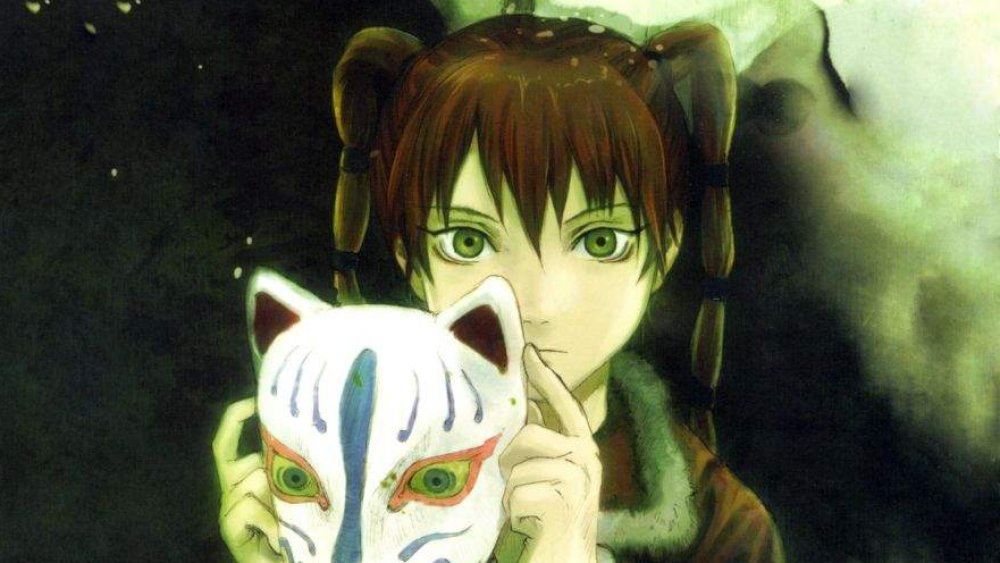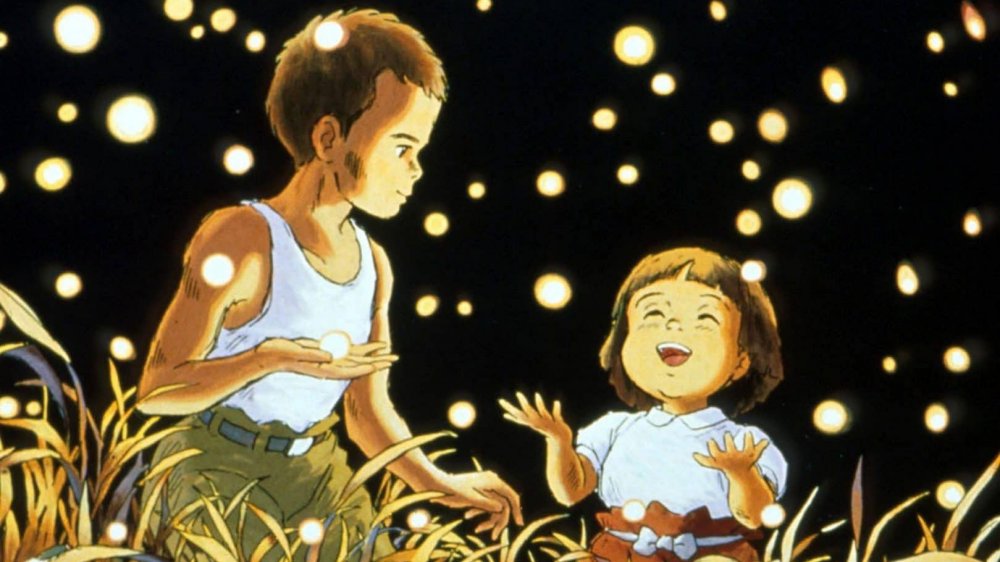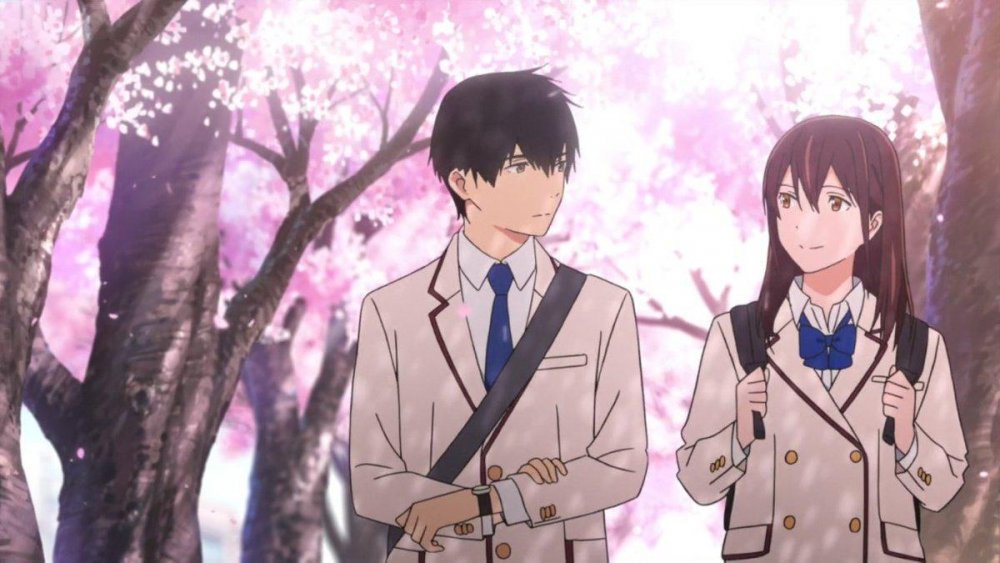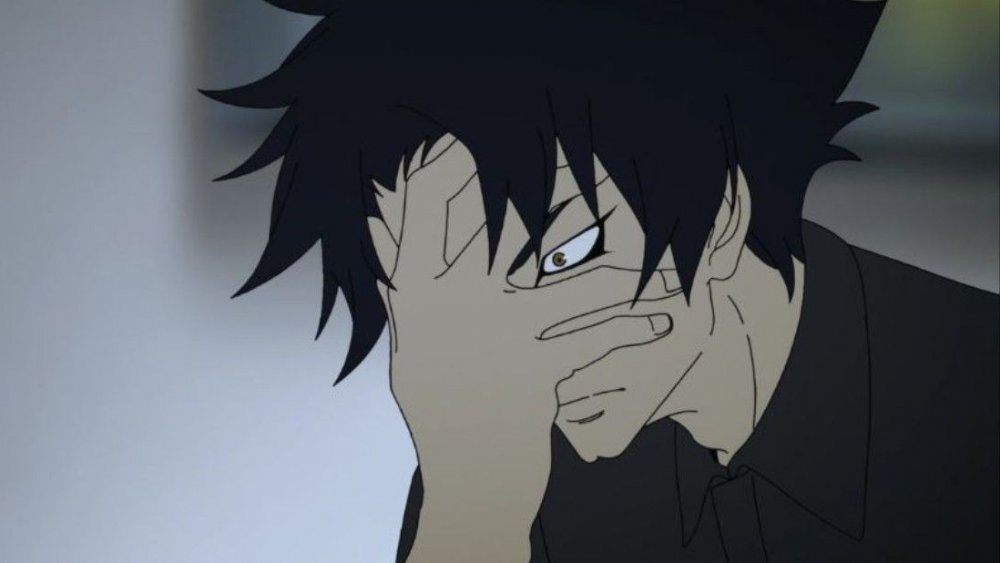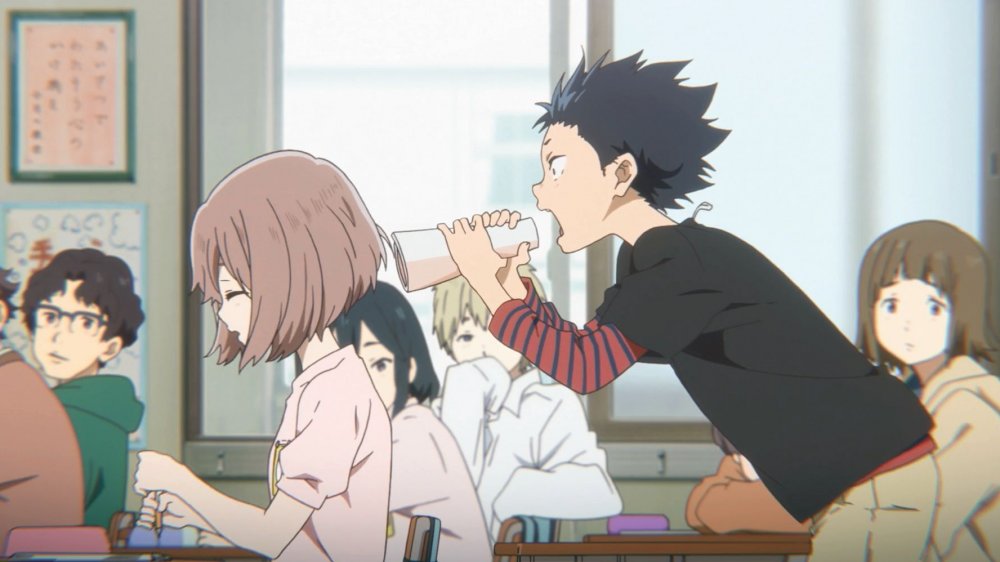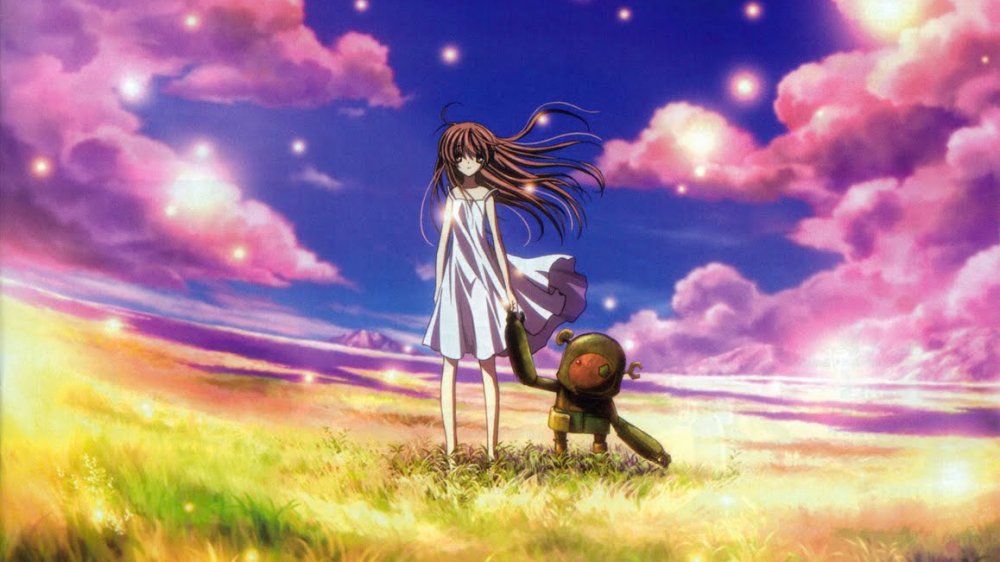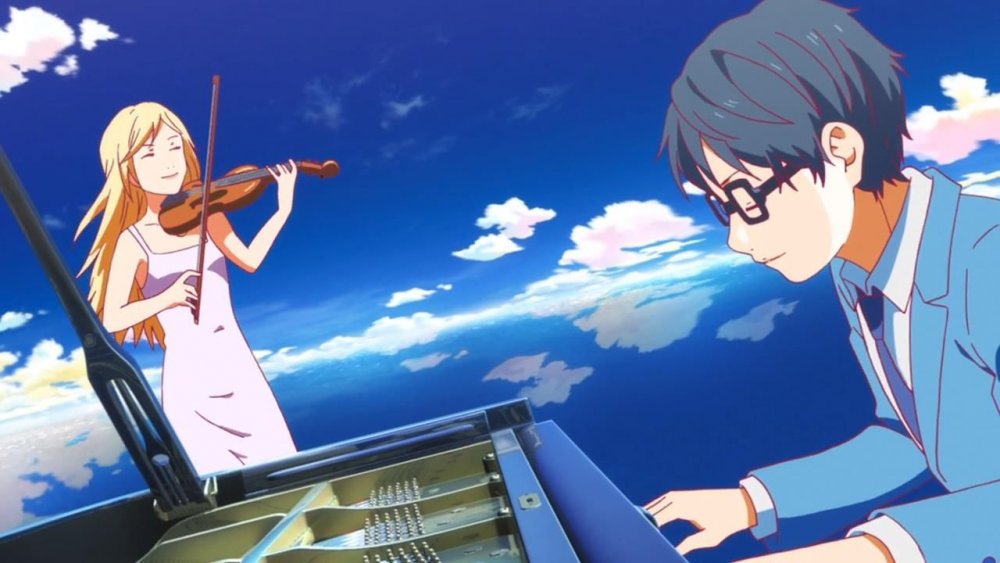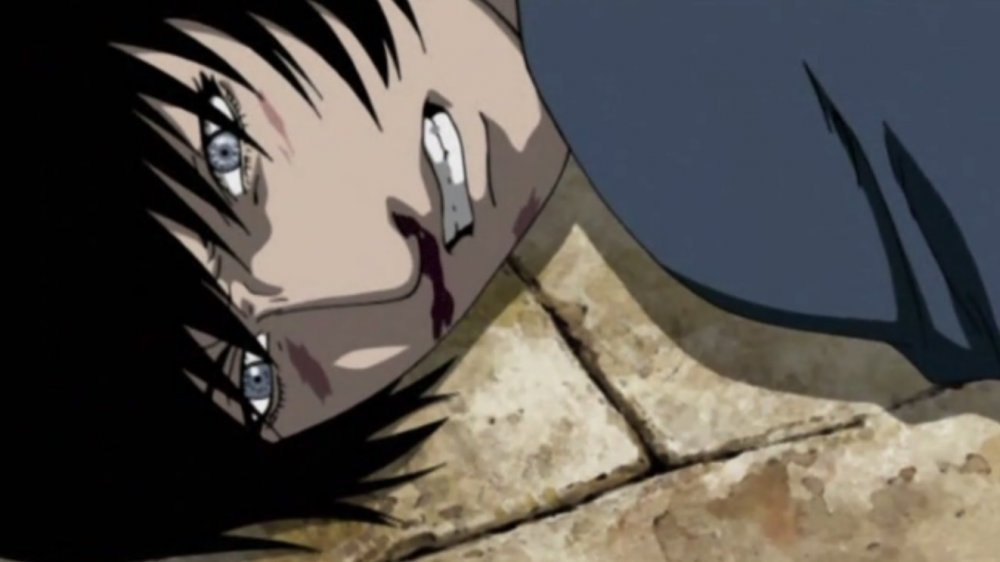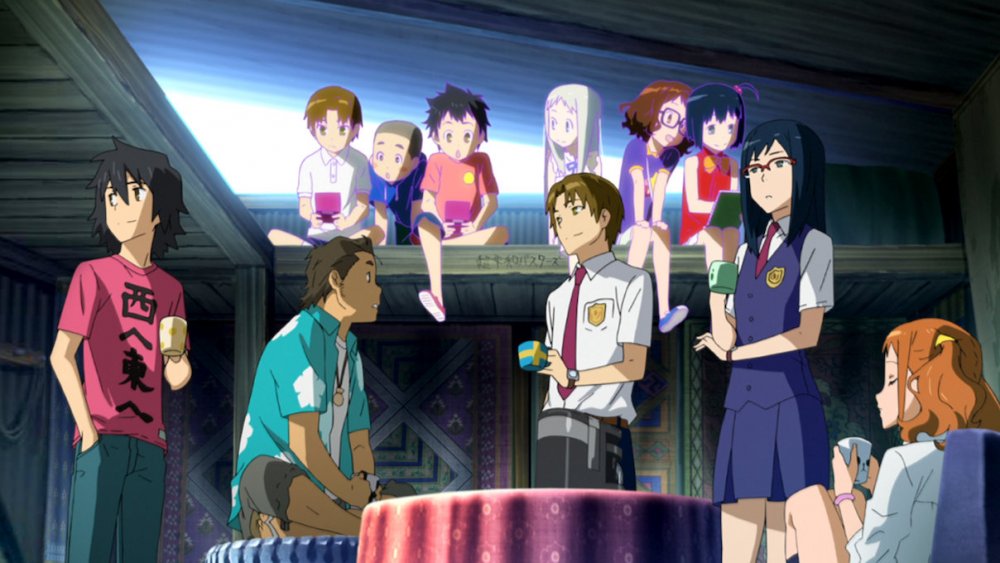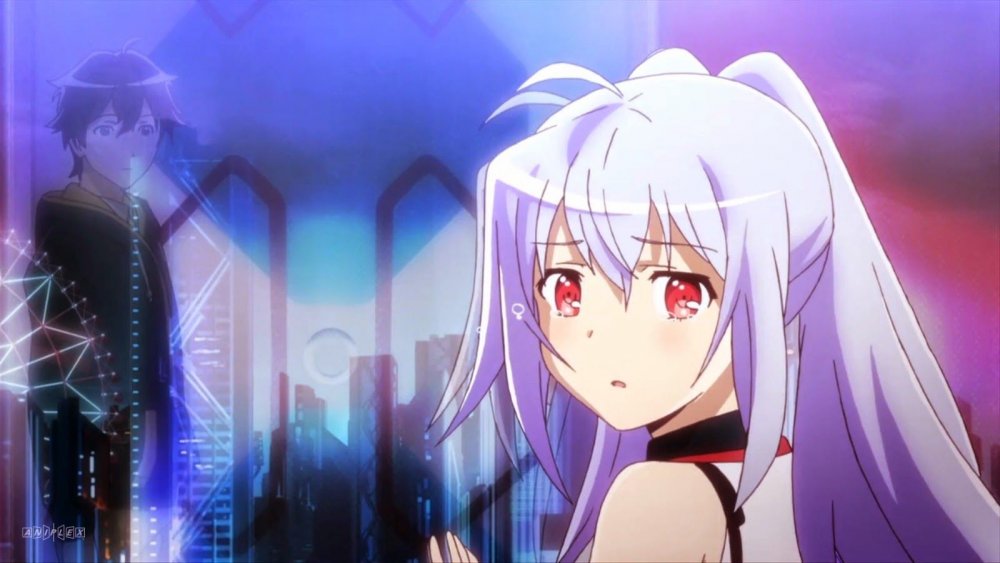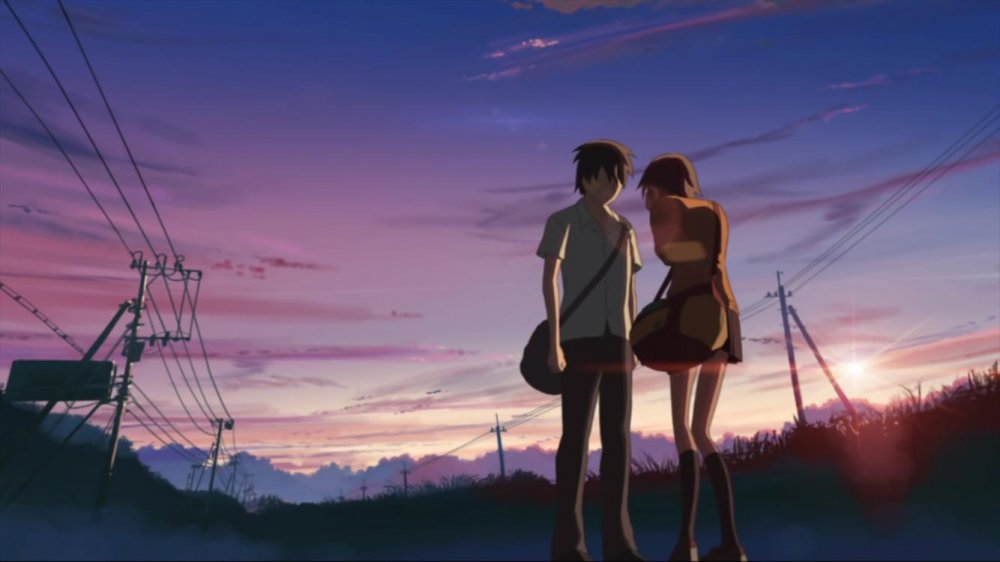The Saddest Anime Storylines Ever
The crossover success of shows like Dragon Ball Z and Pokemon led many in the west to associate anime with bright colors and big battle scenes, but there's always been way more to the medium than that. While it's true that certain types of anime are designed with the sole purpose of filling viewers with unbridled joy, there are still plenty of creators who prefer to explore the other end of the emotional spectrum in their work.
Sad anime doesn't always work well, but when it does, it can leave a lifelong impression on a viewer. One surefire way to make sure an audience remembers what they're watching is to hit them square in the feels with a storyline that they just can't shake, no matter how hard they try. That's most definitely the case for the following films and TV shows, which we wouldn't recommend watching until you've stocked up on your tissues — or if you don't want to encounter spoilers for some pretty powerful plot twists.
From gut-wrenching war movies and coming-of-age classics to the most heartbreaking love stories of all time, these are the saddest anime storylines ever.
Grave of the Fireflies will crush your soul
Studio Ghibli classic Grave of the Fireflies isn't just one of the best anime films of the 1980s, it's one of the best anime films, period. Written and directed by Ghibli co-founder Isao Takahata, it's the story of Seita and his little sister Setsuko, who try in vain to fight off starvation during the dying days of World War II. What makes Grave of the Fireflies such a crushing watch is that we know right from the get-go that both Seita and Setsuko will die of hunger on the streets of Kobe — Takahata's harrowing classic opens with Seita joining his sister's spirit. The story then jumps back in time, and we get to see the steps they took en route to their sad fate.
Things start to go downhill fast for the siblings when their mother dies following an air raid. Their father is away fighting the war, so they have to strike out on their own as their city burns around them (an experience that Takahata, who passed away in 2018, actually lived through). They end up making their way to a distant aunt, who starts to resent the children as the war lingers on and rations grow ever thinner. Before long Seita and Setsuko are out on their own again, and even though we already know that they won't make it, it's still an emotional gut-punch when they inevitably die.
I Want to Eat Your Pancreas will reduce you to tears
I Want to Eat Your Pancreas might sound like a total gore-fest, but this beautifully animated film from Studio VOLN isn't horror. Based on Yoru Sumino's novel of the same name, the anime follows high school loner Shiga, who forms an unlikely relationship with the most popular girl in his class, Sakura. They're not the type of kids who would normally connect, but Sakura sees the library-dwelling Shiga as an ideal outlet for her secrets, and she's got a big one to share — she's terminally ill. Sakura has a pancreatic disease, and she's managed to keep it hidden from her friends. When she reveals her diagnosis to our protagonist, the pair get to work on finishing her bucket list.
The audience is never under any illusions about Sakura's fate here. The film (directed by Shinichiro Ushijima, otherwise known for his work on hit series One Punch Man) opens with a funeral and the female lead routinely reminds us that she's going to die, usually in a blunt, matter-of-fact way. It's clear that she doesn't want her new friend to become too emotionally involved in her sad fate, but he can't help himself, and as viewers, neither can we — by the time the credits roll, it's hard not to be moved by their story. The real kicker is that Sakura isn't even killed by her disease, but a random knife attack.
Devilman Crybaby is pure trauma
Dubbed "Netflix's first anime masterpiece" by Geek.com, 2018's Devilman Crybaby was a big win for the streaming giant in its quest to get a foothold in the anime industry. Based on classic Go Nagai manga Devilman (1972-1973), this latest adaptation brings the action to the present day but keeps the original premise. It's the story of scrawny teenager Akira, who gets sucked into a world of debauchery and violence after his best friend, university professor Ryo, reveals the existence of an ancient race of demons. A powerful demon named Amon attacks Akira during a shockingly gory night club scene, but he resists being fully possessed. The result is something between human and demon: a Devilman.
The series is called Devilman Crybaby because Akira cries. A lot. He's a highly emotional person, and that doesn't change after his transformation. Our unwilling hero is put through the wringer over the course of ten episodes, facing trauma after trauma. He loses both of his parents to the demons, as well as his friend (and longtime crush) Miki and her whole family. In one particularly upsetting scene, Miki's father discovers her mother being eaten by their possessed son, who sheds a tear as he involuntarily swallows her corpse. For Akira, the final insult is Ryo's betrayal — it turns out that his old pal is actually Satan himself, and he's been pulling the strings the whole time. This show turns even the hardest anime fans into crybabies.
A Silent Voice will leave you speechless
Naoko Yamada's third feature film A Silent Voice explores the impact of bullying, a topic that's been covered in anime on countless occasions. Where A Silent Voice stands out from the pack is that it tells the story from the perspective of the bully, a boisterous boy named Shoya who takes a particular interest in deaf transfer student Shoko. In the original manga, Shoya's teasing is shown to be born from a genuine desire to get closer to Shoko, though in the anime (a faithful but unavoidably condensed version of the source material) that isn't always clear, which makes his behavior all the more shocking. It's hard not to feel for Shoko when she has her hearing aids ripped out, leaving her with bloody ears.
The trick this movie manages to pull is that you don't totally hate Shoya by the end of it. His horrendous treatment of Shoko is what makes A Silent Voice a truly sad watch, but his bullying also leaves a scar on him. When the movie skips ahead to high school, Shoya is the one suffering, shunned by his peers and haunted by his mistakes. He ultimately finds redemption, but there's a lot more sadness before the end, including (but not limited to) heartbreak, a coma, and a suicide attempt.
If you or anyone you know is having suicidal thoughts, please call the National Suicide Prevention Lifeline at 1-800-273-TALK (8255).
Clannad: After Story takes sadness to another level
Clannad is a pretty sad show, but follow-up series Clannad: After Story's reputation as a tearjerker is near legendary in anime circles. The show has been known to provoke strong reactions from viewers ("I had to stop the video and cry it out in the bathroom," one Redditor admitted), but how sad is it, exactly? That depends on how patient you are. Even the biggest fans of Clannad: After Story will admit that the show gets off to a slow start. The first eight episodes follow the same pattern as the original series, with short arcs that are wrapped up relatively quickly. Episode nine is when the real after story begins.
Tomoya and Nagisa (who fell in love as high school students in Clannad) are all grown up now, and they're having a baby. The illness that forced Nagisa to stay behind in school in the original series is still present, however, and it only seems to worsen the longer she's pregnant. Nagisa gives birth to a daughter but dies soon after, devastating her high school sweetheart. A depressed Tomoya buries himself in his work, failing to forge any kind of emotional connection with little Ushio. Just when he sees the error of his ways and starts spending quality time with his daughter, fate intervenes — Ushio dies in his arms, succumbing to the same illness that took her mother. Clannad is melodramatic, but Clannad: After Story is straight up traumatic.
Your Lie in April delivers a devastating double blow
Beautifully animated but tremendously sad, 2014's Your Lie in April was a huge hit in Japan, and it made a big impression on the global stage after being picked up by Netflix. Based on Naoshi Arakawa's manga of the same name, this is the story of a famous piano prodigy who suffers a double tragedy. The talented Kousei goes through a mental breakdown after the death of his terminally ill mother, losing his love for the instrument. A-1 Pictures does a great job of projecting his mood with a carefully chosen palette, which consists primarily of dark hues to begin with. When Kousei meets an outgoing 14-year-old violinist named Kaori, the color scheme changes dramatically.
Kaori (who decides to help Kousei rediscover his love for the piano) brings light and purpose back to our protagonist's world, but his happiness is short-lived. It's hard watching the young pianist's mom pass away after a long battle with a terminal disease, so when he finds out that Kaori is also dying, it's truly heartbreaking. In the climax, Kaori undergoes surgery as Kousei takes to the stage. When her spirit appears next to him during his big performance, he (and we, the sobbing viewers) realize that she has died on the operating table. Your Lie in April is such an emotional rollercoaster that Kotaku began its review of the film with the following: "Warning: This anime might just make you cry."
Texhnolyze will leave you feeling utterly hopeless
Texhnolyze isn't just very different from the rest of the anime on this list, it's very different, period. The cyberpunk setting and exploration of humankind's increasingly intimate relationship with technology are nothing new, but Texhnolyze ramps the nihilism up to all new levels. This original anime unfolds in Lux, an underground city torn apart by warring factions. We see this grim, violent world through the eyes of Ichise, a former orphan who turns to prizefighting for survival. After crossing a dangerous promoter, Ichise loses a leg and an arm, making him the perfect test subject. His limbs are replaced with advanced "texhnolyzed" prosthetics and he falls in league with Organo, a shady conglomerate with ties to the Lux underworld.
What makes Texhnolyze so unique is that nothing good happens to anyone over the course of 22 visually impressive, but highly depressing episodes. The show is uncompromisingly dark, forcing viewers to ask existential questions that they might not like the answers to. Given how the story ends (it's not exactly a happily ever after scenario), it's quite clear that writer Chiaki J. Konaka (Serial Experiments Lain) doesn't hold high hopes for the future of humankind. Texhnolyze is pretty light on dialogue (it resists the urge to bog the narrative down with overly complex world building and philosophical monologues like most anime of this nature), but it's a very heavy show. This one will leave you feeling more hopeless than heartbroken.
Anohana: The Flower We Saw That Day will stick with you
Described as "an anime that that will make even the most jaded heart weep" by Kotaku, 2011's Anohana: The Flower We Saw That Day came from the minds of director Tatsuyuki Nagai, screenwriter Mari Okada, and character designer Masayoshi Tanaka, who go by the collective name Super Peace Busters. It's the story of six childhood friends who begin to drift apart after one of their group dies in an accident. Five years on from the tragedy, the group's de facto leader, Jintan, has become a school dropout and total recluse. He seems destined to live out his days like this, but everything changes for him when the ghost of his late friend shows up.
Menma cannot pass into the afterlife until her unfinished business is taken care of, so Jintan decides to leave his shell and get the gang back together. The trouble is, nobody else her can see Menma's ghost. Some of Jintan's friends believe that he's hallucinating and accuse him of not being able to get over Menma's death, though in truth, none of them have truly gotten over what happened to Menma. Anohana: The Flower We Saw That Day is a show about loss, and how it can affect people in different ways. They all ultimately learn something thanks to Jintan's intervention, but there's a sadness about this show that stays with you long after the final episode.
You won't forget Plastic Memories in a hurry
This heartbreaking little show from studio Doga Kobo had anime fans in floods of tears in 2015. Plastic Memories is set in a near future in which androids that look exactly like humans exist. The newest model (the Giftia) is capable of experiencing human emotion and creating unique memories, but it only has a lifespan of around nine years and four months. When a Giftia passes its expiry date it begins to malfunction and can even become violent, so the manufacturer employs people to pry them from their often unwilling owners when the time comes. That's where Tsukasa comes in.
After messing up his college entrance exams, Tsukasa is forced to get a job in the Terminal Services. He's partnered with an android named Isla, who (unbeknown to Tsukasa) is nearing the end of her lifespan. The 18-year-old falls in love with the silver-haired Giftia over the course of 13 stunningly rendered episodes, and when he discovers that Isla doesn't have long left, the audience feels that pain. The pair discuss running away together to avoid Isla's fate, but she refuses to allow Tsukasa to abandon his life for her. In the end, there's nothing left for him to do but his job. They spend their final moments together inside a private Ferris wheel gondola, which lights up with the familiar spark of an android being retrieved. We're not crying, you're crying!
5 Centimeters Per Second is about growing up and growing apart
A film by acclaimed anime writer and director Makoto Shinkai (the man behind international crossover hit Your Name), the deeply affecting 5 Centimeters Per Second is all about the realities of growing up and how that often means growing apart. The story revolves around two close friends whose lives go in different directions when one is forced to move home. The title refers to the speed at which cherry blossom petals fall, something Shinkai uses as a metaphor in this film — petals often begin their descent together, but inevitably drift from one another, just like Takaki and Akari.
The pair become close during the first act of the film, during which Akari arrives in Tokyo as a transfer student. They bond over their shared allergies and common interests, but before they can reveal their feelings to one another, life throws them a curveball. This time it's Takaki's parents who are moving, and they're heading to the opposite end of the country. He and Akari share a kiss before embarking on different paths, and while both characters continue to long for each other over the years that follow, circumstances keep them apart. It's a relentlessly sad story with a bittersweet ending that turned Tokyo's Sangubashi railway crossing into an iconic real-life anime location.
